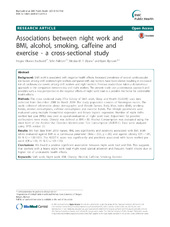Associations between night work and BMI, alcohol, smoking, caffeine and exercise - A cross-sectional study
Peer reviewed, Journal article
Published version

Åpne
Permanent lenke
https://hdl.handle.net/1956/11861Utgivelsesdato
2015-11-12Metadata
Vis full innførselSamlinger
Originalversjon
https://doi.org/10.1186/s12889-015-2470-2Sammendrag
Background: Shift work is associated with negative health effects. Increased prevalence of several cardiovascular risk factors among shift workers/night workers compared with day workers have been shown resulting in increased risk of cardiovascular events among shift workers and night workers. Previous studies have taken a dichotomous approach to the comparison between day and night workers. The present study uses a continuous approach and provides such a new perspective to the negative effects of night work load as a possible risk factor for undesirable health effects. Methods: This cross sectional study (The SUrvey of Shift work, Sleep and Health (SUSSH)) uses data collected from December 2008 to March 2009. The study population consists of Norwegian nurses. The study collected information about demographic and lifestyle factors: Body Mass Index (BMI), smoking habits, alcohol consumption, caffeine consumption and exercise habits. The lifestyle parameters were evaluated using multiple hierarchical regression and binary logistic regression. Number of night shifts worked last year (NNL) was used as operationalization of night work load. Adjustment for possible confounders were made. Obesity was defined as BMI > 30. Alcohol Consumption was evaluated using the short form of the Alcohol Use Disorders Identification Test Consumption (AUDIT-C). Data were analyzed using SPSS version 22. Results: We had data from 2059 nurses. NNL was significantly and positively associated with BMI, both when evaluated against BMI as a continuous parameter (Beta = .055, p < .05), and against obesity (OR = 1.01, 95 % CI = 1.00-1.01). The AUDIT-C score was significantly and positively associated with hours worked per week (OR = 1.03, 95 % CI = 1.01-1.05). Conclusions: We found a positive significant association between night work load and BMI. This suggests that workers with a heavy night work load might need special attention and frequent health checks due to higher risk of undesirable health effects.
